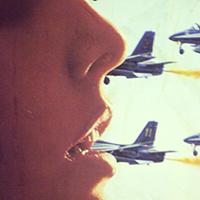"FARM from POLIS"
"One had to be versed in country things
Not to believe the phoebes wept."
We know some of the reasons the kestrels do stuff. Though the archive beyond that is kind of shallow. Up there in the pellucid wind speckled under the growling clouds a flock of darkened avocets seeks Lake Lida. I read once that it was the migratory birds who somehow retain in their schoolhouse genes and spyglass heads the roots of the great rock and ice libraries, who can still trace, out to the arctic hippies, the old lobes and cliffs of the melted Laurentide ice sheets, true docents of the Cenozoic deeps, the goose and owls such shawled magi just like the comic books tell they are.
There is enough about ourselves to like though down in our towns and metallic craft, clanking by our own houses on our way with rashes to have a disease, go to a beach, leave behind one who loved us, debrided and steaming. And sometimes in the face of all this driving one can wonder what was rehearsed and lost in the algorithms of the bears or consider that somehow we have stuffed something hard and muffled into the farms.
It was outside Flom, then, on the farm that formed them, in one of the boggier of the adjacent hectares, at autumn, that I came-to at twilight, at the edge of a bonfire, the cold smells of muds and smoke mostly the stuff that woke me. The cows were decades gone. The nearer silo was beringed with dried beaver tails. The birch on the fire, the buttoned tree, its cloth peeling to embered pages, plunged upward into the terminator. To seek the prized and rare affections found among those proximate to a fire, a being has to be politically qualified to approach the commune of the warm: we share coats and chairs and food, blankets and worry, in these rare and uncertain bubbles of abundance.
Obviously the question is how does someone find themselves on a farm. Farms so readily inhabit the distance that we can't as likely say "here is the farm" as "there is the farm." They are such a puzzle of the distance, and maybe even of the past, that standing on one it might not be obvious one is doing so. Seen just under the horizon, a far clutter of upright barges, as if there were a small prolapse in the azimuth, the farm is a conflagration frozen in the background, its clarinet tootings and bridge rattlings, the runnings before floods, the arrival and carting of ripe and wet babies, its meal-smeared furnitures: none of this is heard or seen.
Something about this endless enclosure inspires its requisite apathy. The farm resists the observer: it is hard to find a farm. And the farm once found is so conceptually smooth it offers few handles by which it can be grasped and turned over in the mind. I'm not so sure what the countryside is if not a sea of fuel, onerous to cross, not the wilderness, not the town, not even a space one could dignify with romantic sobriquets like liminal, interstitial, borderland, margin. And what after all has guaranteed the flourishing of the farm? They are not like the other islands of green that rose in the ice. A mott will crash slowly into a grassland, groups of wolves might float, collared locusts, down a creek in single file, risen from collected forces that move under rivers or tunnel the plains, the cows while here bear milked anchors, a pigs is its own anvil, each hen a hatched cannonball, the farmed are the cousins of the sea-drowned. The pelagic evening, about the cow, in its special revolution, paints a storm on the trees in an orange made by another horizon, a jet strokes our passing life with its exhaust, our desks are everywhere encrusted with a spilled collection of river relics, the sea washing its objects in the wheat, every mattress in the farmhouse was, worked under an earlier generation, snagged by arteries, the sleeves in which pity, liquefied, is dressed. Then somehow, contiguous across a season, organized and smoothened, the caloric shells of lilacs, at the anentropic limits of nutrition, are extracted by a circumstance in the weather, even as we do what we do on each other's mouths, this calmly disquieting eating of something in the other.
Back to The Issue | Back to the Top
Author Bio: Gabriel Gudding is the author of Literature for Nonhumans (Ahsahta, 2015), Rhode Island Notebook (Dalkey Archive Press, 2007) and A Defense of Poetry (Pitt, 2002), as well as numerous chapbooks. His essays and poems appear in such periodicals as Harper’s Magazine, The Nation, and Journal of the History of Ideas, in such anthologies as Great American Prose Poems, Best American Poetry, Best American Experimental Writing, and &Now: Best Innovative Writing. His translations from Spanish appear in anthologies such as The Oxford Book of Latin American Poetry, Poems for the Millennium, and The Whole Island: Six Decades of Cuban Poetry.
